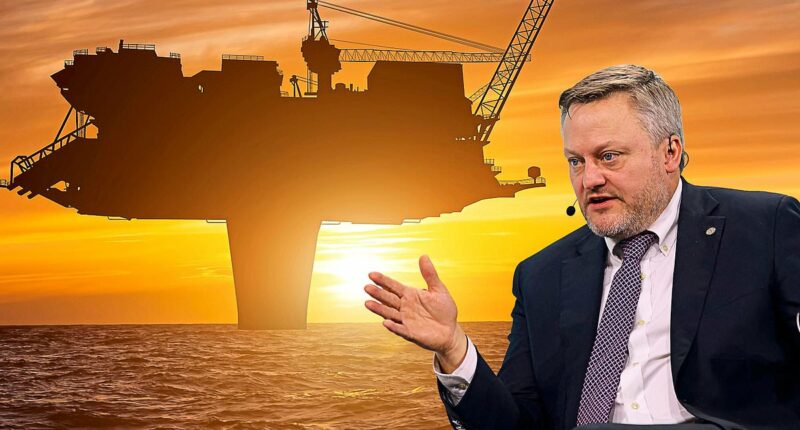Share this @internewscast.com
BP’s chief executive, Murray Auchincloss, may finally be feeling a sense of relief as investor pressure on him to produce swift returns begins to diminish. This change comes in the wake of a rebound in the company’s previously struggling stock price and a groundbreaking oil discovery in Brazil.
For some time, BP has faced intense scrutiny from activist investor Elliott Management, which has been pushing for improved performance. There has even been speculation about a possible takeover, with UK rival Shell emerging as a potential suitor.
However, as BP gears up to release its third-quarter results on Tuesday, optimism is on the rise. There is a growing belief that Auchincloss, alongside newly appointed chairman Albert Manifold, who took over on October 1, is steering the energy titan back onto stable ground.
The upcoming results are anticipated to reveal an increase in production compared to the second quarter, though still lower than the previous year. Analysts predict the revenue for the three-month period ending in September to reach £47.8 billion.
Despite the positive developments, Auchincloss’s position is not entirely secure. He must still persuade the new chairman that BP can fulfill its promises of cost reductions, reduce its substantial £19.8 billion debt, and continue with share buyback initiatives.
Should he fail to meet these expectations, it often falls upon a new chairman to replace an underperforming chief executive. This places added pressure on Auchincloss to prove his capability in navigating BP towards a prosperous future.

New dawn: Chief executive Murray Auchincloss has been under pressure from activist investors to turn the FTSE 100 company’s fortunes around
Manifold had a reputation for a steely focus on the bottom line and shareholder returns in his previous job as chief executive of construction and building materials group CRH, so he is unlikely to have any qualms about executive defenestration should the need arise.
BP has been through a torrid time following the departure of former chief executive Bernard Looney in 2023 and the replacement of chairman Helge Lund this year. Both men were key architects of the oil group’s overzealous switch to green energy which it is now scrambling to reverse.
The combination of changes at the top, a rapid reversal of the climate change agenda and aggressive demands from Elliott, which still owns 5 per cent of the group, led to intense takeover speculation earlier this year and a blunt denial from Shell that it had any interest in a merger deal.
The Shell statement in June stopped it from tabling any bid for six months under UK takeover rules, so it is still possible that it could come back when the lock-up expires on Boxing Day.

Comments from Shell boss Wael Sawan last week that the firm was interested in potential deals may have raised eyebrows in this regard, although he ruled out any ‘big-scale’ takeovers.
It is known, however, that BP did seek a joint venture with Shell’s exploration bosses on a discovery off Brazil in an effort to lower its costs developing the oilfield.
Shell declined the offer – a decision it may now be regretting given the extent of the Brazilian find.
In an update last week Gordon Birrell, BP’s vice president of production, was effusive about its scale, which was twice as large as previously thought.
The Brazil find is the biggest by BP in a quarter of a century and underpins the group’s reputation for being among the world’s leaders in oil exploration.
Criticism of BP’s strategy by Elliott has also calmed for the moment, with the activist currently focusing instead on shaking up drinks giant Pepsi-Cola.
But Elliott and Auchincloss are still out of step on BP’s spending programme. The chief executive is sticking with plans to spend £12 billion to £13.7 billion a year.
Elliott wants to see the outlays trimmed to £10.7 billion to £11.4 billion. But for now, the activists may have been satiated by a bounce in BP’s stock price.
The shares have climbed nearly 20 per cent over the past 12 months and the company’s market value has improved by almost £10 billion since a nadir in April.
BP is also able to show that a fatter spending programme can bring rich rewards. In addition to the Brazil discovery, 2025 has been a strong year for the oil and gas divisions with six major project start-ups and an improvement in the reliability of its plants and refineries.
One potential snag, however, is Auchincloss’s commitment to delivering some £2.3 billion to £3 billion of asset sales this year as part of the effort to reduce debt. An overall decline in oil prices this year and a lack of enthusiasm for green energy amid a backlash against net-zero policies mean BP may struggle to achieve the hoped-for returns.
The group’s balance sheet has been under strain since 2010 when the Deepwater Horizon explosion in the Gulf of Mexico gobbled up £50 billion.
It also had to absorb an expensive write-down of £18 billion in its stake in Russian oil group Rosneft following the war in Ukraine, which had previously been a cash gusher for the group.
So while the share price may have recovered and some immediate threats have receded, it won’t take much for the pressure on BP’s bosses to ratchet back up.
DIY INVESTING PLATFORMS
AJ Bell

AJ Bell
Easy investing and ready-made portfolios
Hargreaves Lansdown

Hargreaves Lansdown
Free fund dealing and investment ideas
interactive investor

interactive investor
Flat-fee investing from £4.99 per month
InvestEngine

InvestEngine
Account and trading fee-free ETF investing
Trading 212
Trading 212
Free share dealing and no account fee
Affiliate links: If you take out a product This is Money may earn a commission. These deals are chosen by our editorial team, as we think they are worth highlighting. This does not affect our editorial independence.
Compare the best investing account for you







